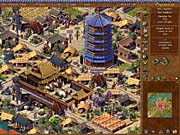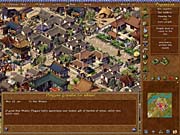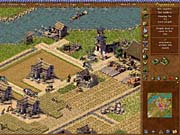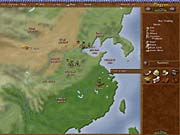Emperor: Rise of the Middle Kingdom Preview
We take a hands-on look at Sierra's next city-building game, which will take place in imperial China.
Despite the fact that games with historical settings aren't often successful, we've seen a new city-building game from Sierra every year since Caesar III's release in 1998. There's a recipe to this success. With Caesar III, Impressions Games got to the essence of its earlier games set in the Roman Empire, focusing on the city building and simplifying the interface down to a single SimCity-like view. The resulting gameplay formula has proved amazingly resilient as the scenery has changed, first to ancient Egypt, then to Greece, and now to imperial China. Not only does Emperor: Rise of the Middle Kingdom survey the rise and fall of seven imperial dynasties over 3,000 years, but it also makes history as the first game in the series with multiplayer play.

Although the Impressions name is still associated with the series, this time around Sierra has handed the development duties over to BreakAway Games, the studio responsible for the Cleopatra expansion pack to Pharaoh, as well as Paradise Island, the recent add-on to Tropico. We've spent some time with an early build of Emperor and can say that BreakAway has put together a game that'll make any fan of the series feel right at home. The setting lends itself well to the series' gameplay, and the game not only includes new architectural styles, types of goods, and campaign scenarios, but it also introduces the Chinese zodiac and the concept of feng shui.
Emperor spans 3,000 years of history and seven campaigns set during China's most famous imperial dynasties. Military, religious, and building advances are generally grouped into three ages: bronze, iron, and steel. A number of the campaign missions focus on building monuments, such as sections of the Great Wall or canals. These construction projects are analogous to building pyramids in Pharaoh, and they require quite a bit of time and effort. It's satisfying to see them to completion, and they add some variety to the building missions. Other missions focus more on trade or military competition with neighboring cities.

The core of city-building games is knowing what, when, and where to place structures, and feng shui adds an extra factor to consider when building. Best known today for how it's used in interior decorating, feng shui is the Chinese art of positioning buildings and objects in an auspicious and harmonious way. As it plays out, this means structures you're about to place turn green, yellow, or red depending on their suitability for a given location. From what we've seen so far, both the underlying terrain and the relative positioning of building types seem to determine which locations are appropriate. It can be something of a mystery as to why important buildings, such as inspection towers to keep structures safe, can be particularly hard to find a green location for. Fortunately, not everything has to be perfect. While feng shui affects your popularity with the people and the effectiveness of religious celebrations, the game considers it average to have only two-thirds of your buildings in harmony with the terrain, which is quite manageable. Residential walls are commonly used in Chinese cities to divide up districts and can be used to better manage the desirability of neighborhoods, especially to keep out the negative influence of agriculture or industry. As in previous games in the series, creating highly desirable housing is key to success in Emperor, as it allows for much higher population densities, higher tax income, and a market for luxury goods.
Build Cities Online

Religious celebrations set the game's rhythm. Each year, you're prompted to sponsor New Year's festivities, but it's important to make offerings to ancestral, Taoist, Confucian, and Buddhist gods more often than that. Once you've built the appropriate temples and shrines, religious offerings are necessary to appease the gods, who, depending on how well you treat them, can either cause natural disasters or attract heroes who walk around the city bestowing bonuses. Also, when you start a campaign, you select one of the 12 zodiac signs that are typically associated with one's birth year. In the years matching that sign, you'll receive bonuses to areas such as your city's production or your combat abilities. The Chinese setting offers new concepts to explore in Emperor, but there have been other changes under the hood.
The Impressions games have always done a good job of conveying the hustle and bustle of cities with detailed 2D art. Emperor's graphics take a small technical step forward to support the higher resolution of 1024x768, as well as 800x600, and the developers have used the extra pixels to pack in even more detail into building animations. Even at this early stage, the art for high-level housing like the palatial compounds for nobles and the animations for entertainment buildings like the musicians' and acrobats' schools seem particularly well done. Still, after the bright colors in Zeus, with its more comic style and use of varied Mediterranean terrain, it's easier to notice the prominent browns and greens of Emperor's palette. But, in any case, it'll be a relief to some that the 2D graphics keep the game's hardware requirements modest.

Emperor's multiplayer comes in both competitive and cooperative modes. Simple diplomacy options have been added to the regional map, and spies and emissaries can report back on the layout of allied and rival cities. The cooperative mode seems to work much like typical missions, focusing on trade and joint goals, like racing to finish sections of the Great Wall. The competitive mode is aimed more at military expansion. With this in mind, the combat system has been rebalanced somewhat, mostly to include siege weapons that are better able to cut through city walls. Even though the hours often seem to roll by when playing city-building games, Sierra says that multiplayer games in Emperor are designed to take only 90 minutes or so, but the game will have a save option, just in case.
From what we've seen so far, Emperor: Rise of the Middle Kingdom is shaping up to be a solid evolution of the series' traditions, adding the puzzlelike element of feng shui, streamlining some mechanics (like army conscription), and bringing multiplayer possibilities into the picture. Sierra consciously tried to make Zeus more accessible with shorter, more story-driven missions, and it remains to be seen whether this balance has been maintained in the new game. One side effect of the scale of the Chinese setting is that the historical context is spread more thinly, and most likely won't be as familiar with the names and geography as they were with the previous game's ancient Greek setting. But all things considered, Emperor promises to provide fans of the series with plenty of new challenges when it's released this fall.
Got a news tip or want to contact us directly? Email news@gamespot.com
Join the conversation